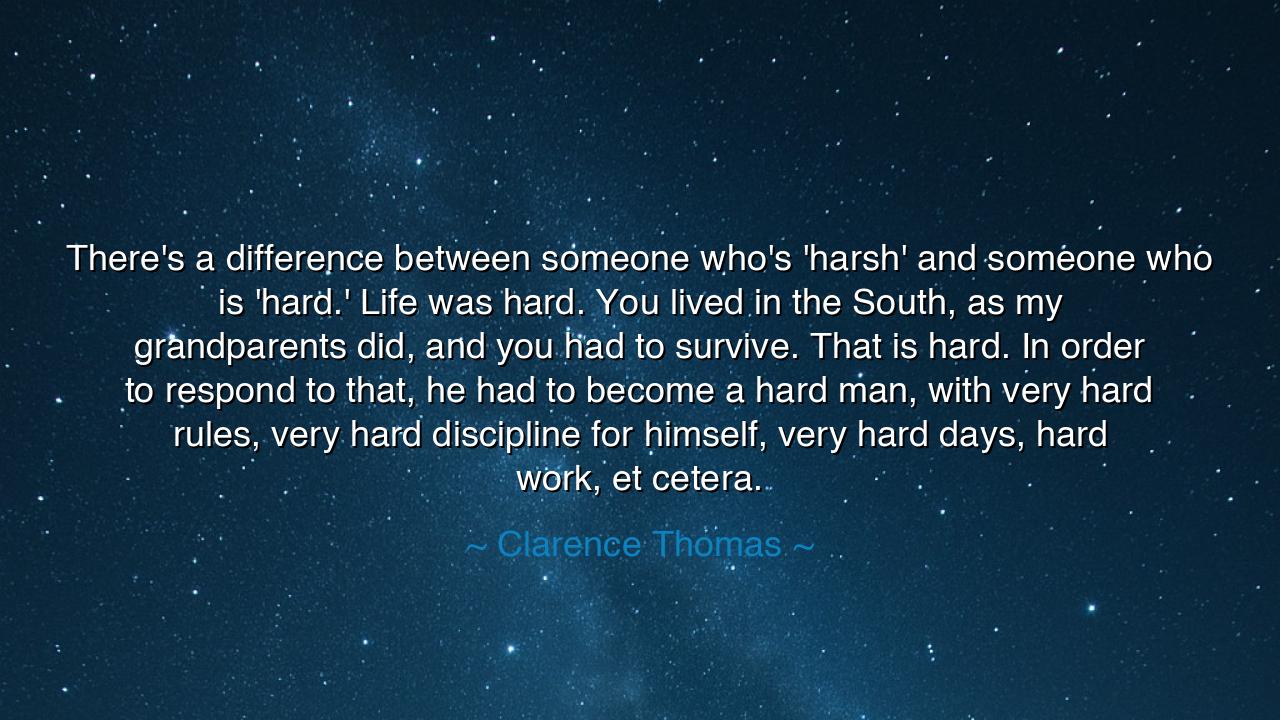
There's a difference between someone who's 'harsh' and someone
There's a difference between someone who's 'harsh' and someone who is 'hard.' Life was hard. You lived in the South, as my grandparents did, and you had to survive. That is hard. In order to respond to that, he had to become a hard man, with very hard rules, very hard discipline for himself, very hard days, hard work, et cetera.






In the chronicles of human struggle, there exists a sacred distinction between being harsh and being hard. To be harsh is to wield cruelty without purpose, like a tempest that destroys without nourishing the earth. But to be hard is to forge the spirit in the fires of necessity, as iron is tempered by flame and hammer. Life was hard, and from this truth arises the wisdom of Clarence Thomas, whose words echo the ancient understanding that survival demands strength greater than comfort.
In the lands of the South, where his grandparents dwelt, the soil was heavy with toil and the air thick with injustice. There, survival was not granted by fortune, but seized through unyielding will. The ancestors knew well that the world would not bend for them, and so they bent themselves to meet it, shaping their days through unrelenting labor and discipline. This was the essence of being hard—not born of malice, but of necessity.
To face a hard life, one must become a hard man. Such a person walks the path of strict rules, enduring hard discipline, hard days, and hard work. His heart may seem cold to those who have not tasted struggle, but beneath his sternness lies a deep love: the love that seeks to preserve life, family, and dignity in a world that offers none freely. In the scrolls of time, many warriors and sages bore this same burden, shaping generations through their unyielding example.
Thus, let the youth understand: a harsh hand may wound, but a hard hand may save. For hardship is the crucible through which greatness emerges. When the storms of fate howl and the night grows long, it is the hard who endure, who keep the fire burning for those who come after. Their sternness is not cruelty, but a gift of survival.
These words shall be carried forward, like sacred fire passed from one age to the next. They teach that even in the face of suffering, strength can be shaped, and through that strength, a people may rise from the ashes of hardship to the dawn of freedom.






YMYoongi Min
Thomas’ point about hard rules and discipline in response to a difficult life situation is insightful, but it also makes me wonder—how can we balance strength with empathy? Can someone who has endured hardship be both strong and compassionate, or does toughness require emotional distance? Is there a way to retain the lessons learned from difficult experiences without allowing them to permanently shape our behavior in ways that may limit our growth or relationships?
ANAnh Nguyen
Clarence Thomas' comment about life in the South and the necessity of being 'hard' to survive brings up an important point about resilience. But how much of that hardness is necessary for survival, and how much is it a learned behavior that we could unlearn? Can we thrive without the rigidity that life’s hardships sometimes require? And when does the hardness become a burden rather than a strength?
T9Hong Trang 9/5
This quote raises the question of whether being 'hard' is a defense mechanism developed over time or an inherent part of someone's nature. It makes me wonder—can being hard ever be beneficial to a person’s mental and emotional health, or does it just create distance between them and others? How can we learn from hard times without adopting an overly tough exterior that makes us difficult to connect with?
NTBao ngoc Nguyen thi
Thomas' reflection on his grandparents' hard life in the South brings attention to how life experiences can mold a person. It made me think—how much of the 'hardness' we see in people today is a result of the environments they grew up in? Can hardship truly justify strict rules and unyielding discipline, or does it sometimes create a cycle of harshness that can affect relationships? How can one soften while maintaining strength?
NTnguyen thao
Clarence Thomas' distinction between being 'harsh' and being 'hard' offers an interesting perspective on how survival can shape one's character. It makes me wonder—can enduring hardship truly build resilience, or does it sometimes lead to an overly rigid mindset? How do we differentiate between a hardened individual who has survived and one who is just emotionally or mentally closed off? Is there a way to be strong without becoming too hard?